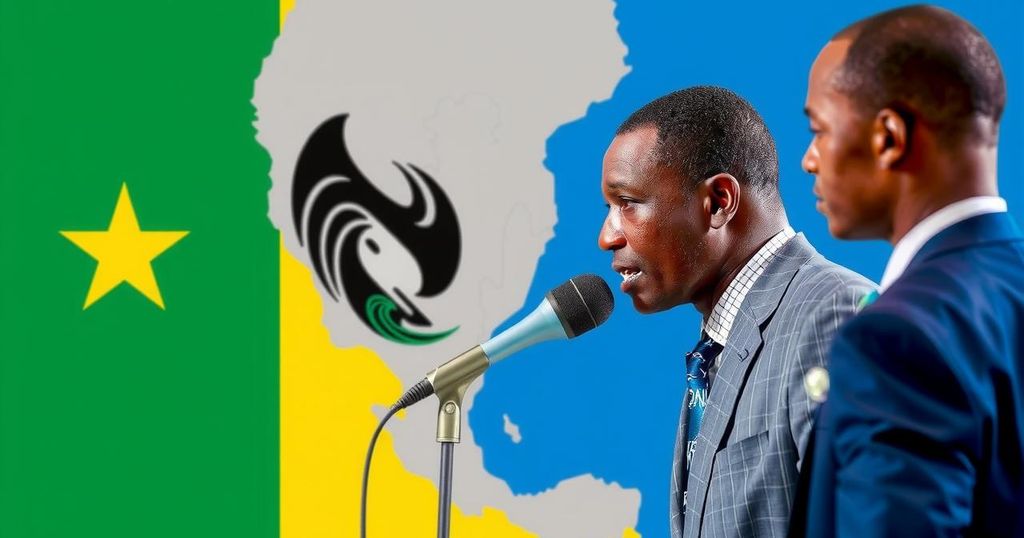Media Crackdown Threatens Independence Ahead of Guinea-Bissau Elections
Ahead of Guinea-Bissau’s elections on November 2, media organizations face financial and ethical challenges that compromise their independence. Despite some support from the UNDP, many journalists struggle with the high cost of licensing fees imposed by the government. This tense political environment is marred by corruption and intimidation against media personnel, raising concerns about press freedom as the elections approach.
As Guinea-Bissau approaches its November 2 elections, the atmosphere is charged with political tension, and both politicians and journalists are gearing up for an intense campaign. The critical election season presents myriad logistical and ethical challenges for reporters who are striving to maintain journalistic integrity amid political pressures. Media organizations are actively preparing coverage proposals for international assistance, particularly targeting the United Nations Development Program (UNDP), to secure crucial funding for transportation, accommodation, and communication during the elections. The necessity for financial support has historically rendered many media outlets in Guinea-Bissau reliant on political candidates, which poses a risk to their impartiality. It has thus become increasingly important for these organizations to seek funding from international and regional entities to preserve journalistic independence. The UNDP has previously provided financial backing to several media outlets, contributing approximately $2,500 each during the recent parliamentary elections to outlets such as radio stations Sol Mansi, Jovem, and Bombolom, along with newspapers O Democrata, Capital News, and Última Hora. In addition to financial support, the UNDP has engaged in promoting civic education in collaboration with the National Elections Commission, aligning directly with local media to facilitate voter awareness. Nevertheless, the Union of Journalists and Media Technicians has reported challenges in acquiring additional support from other international organizations, including the United Nations, the European Union, and ECOWAS. The landscape of Guinea-Bissau’s media is further complicated by the influence of organized crime and the drug trade, which both threaten stability and obscure transparency in governance. Tension has escalated under President Umaro Sissoco Embalo’s administration, particularly after he dissolved the opposition-led parliament last year following accusations of attempted coup. Moreover, the government’s demand for exorbitant licensing fees poses a direct threat to press freedom. Private media organizations have been asked to pay $5,000 for broadcasting licenses, a financial burden that has led to many stations struggling to operate. The Forum of Private Media Organizations has proposed a counteroffer of $3,000 for commercial stations and $500 for community radios, although the government has remained silent on this matter. Amidst these challenges, four political parties and three coalitions are contesting the elections. The pervasive corruption within the political structure, exacerbated by drug trafficking, continues to undermine the effectiveness of governance and the judicial system. Reports from Freedom House cite widespread corruption involving high-ranking officials and the military, highlighting cases such as Malam Bacai Sanha Jr., who was implicated in drug trafficking and a coup financing scheme. In recent years, media outlets have faced severe intimidation, including violent attacks on private station Radio Capital FM and aggressive actions from security forces against journalists. Notably, a Lusa News Agency photographer suffered harassment from the Rapid Intervention Police while covering a political event. Reports indicate that governmental strategies to silence dissent and assert control over the media landscape are intensifying, creating an environment markedly hostile to press freedom. President Embalo’s public statements suggest some acknowledgment of the need for legal conformity among media operations; however, actions on the ground contradict this stance, as journalists continue to encounter restrictions accessing information and covering significant events. The state of journalism in Guinea-Bissau is increasingly precarious, eliciting grave concerns from watchdog organizations over government hostility toward the press. Sadibou Marong, the director for sub-Saharan Africa at Reporters Without Borders, encapsulates the dire circumstances faced by journalists in the country: “The situation of Guinea-Bissauan journalists is dramatic. The president of the republic displays a disastrous attitude toward the media.” With the pressure mounting ahead of the elections, it remains to be seen how these dynamics will affect both the electoral process and the future of press freedom in Guinea-Bissau.
The media landscape in Guinea-Bissau is characterized by a lack of financial independence, resulting in a reliance on external funding and political support. As the country prepares for its impending elections, concerns regarding journalistic integrity have been amplified due to the high stakes associated with the political climate, dominated by corruption and drug trafficking issues. Previous efforts by international organizations, such as the UNDP, to support local media during electoral processes highlight the ongoing challenges faced by journalists to operate freely and accurately report on events. A history of government intimidation coupled with exorbitant licensing fees further exacerbates the pressure on an already strained media environment.
In conclusion, as Guinea-Bissau approaches its elections, the media’s ability to operate independently is severely compromised by financial constraints, governmental pressures, and the influence of organized crime. The situation poses significant risks not only to journalistic integrity but also to the overall democratic process in the country. The upcoming elections will be a critical test of both political stability and press freedom, as heightened tensions suggest a potentially tumultuous environment for journalists and voters alike.
Original Source: www.voanews.com




Post Comment